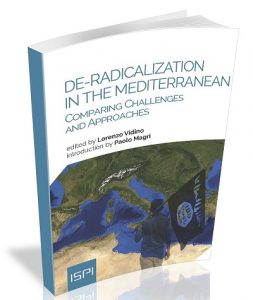DE-RADICALIZATION IN THE MEDITERRANEAN

In the past few years, the MENA region witnessed a rise in jihadist extremism and radicalization, as countries in the area were rocked by a series of deadly terrorist attacks. As authorities responded to the threat, it became clear that in order to effectively counter the phenomenon, traditional repressive measures had to now be accompanied by alternative methods of prevention, rehabilitation and dissuasion.
How have different governments around the Mediterranean responded? What sort of alternative measures have been taken? How effective have these policies been? What further steps can be taken to strengthen the response of the authorities?
These are just some of the key issues that this ISPI Report seeks to cover. The experts in this volume illustrate the policies of contrast, prevention and de-radicalization that have been adopted by countries in the MENA region, revealing emerging trends, lessons learned and overviews of this security status.
ISPI. L’ISPI è un think tank indipendente dedicato allo studio delle dinamiche politiche ed economiche internazionali fondato nel 1934. È l’unico istituto italiano – e tra i pochissimi in Europa – ad affiancare all’attività di ricerca un significativo impegno nella formazione, nella convegnistica e nell’analisi dei rischi e delle opportunità a livello mondiale per le imprese e le istituzioni. L’ISPI privilegia un approccio interdisciplinare e “policy-oriented” reso possibile da un team di ricerca di oltre 50 analisti e può inoltre contare su un network internazionale di 70 università, think tank e centri di ricerca. Nella classifica redatta dall’Università di Pennsylvania, l’ISPI si è posizionato al primo posto al mondo tra i “Think Tank to Watch” nel 2018.
DATI BIBLIOGRAFICI
Curatore: Lorenzo Vidino
Editore: Ledizioni
Collana: Pubblicazioni ISPI
Pubblicato in: luglio 2018
Lingua: inglese
Formato: brossura 157 p.
ISBN cartaceo: 9788867058181
ISBN ePub: 9788867058174
Prezzo cartaceo: 12 €
Prezzo ePub: 6.99€
Leggi l’estratto
//
//

